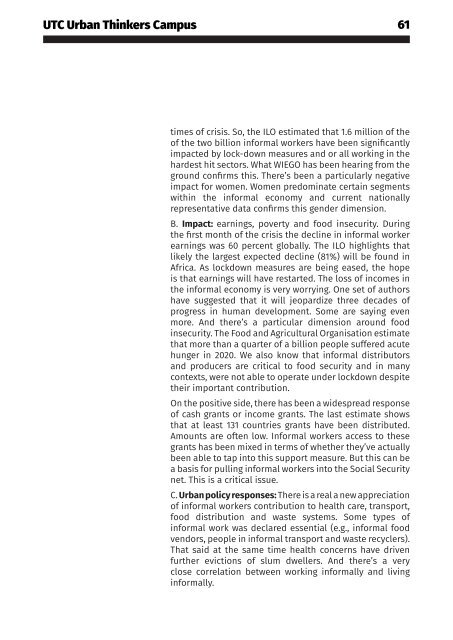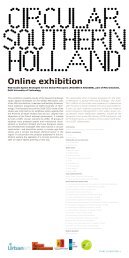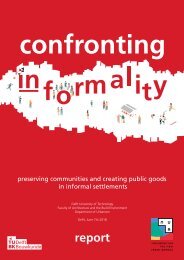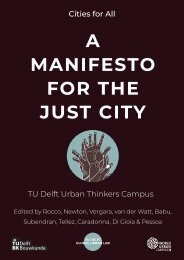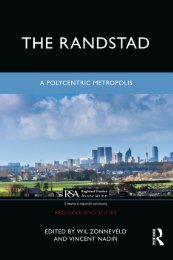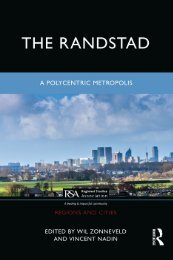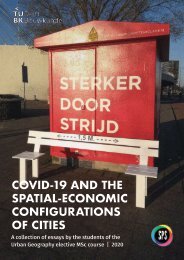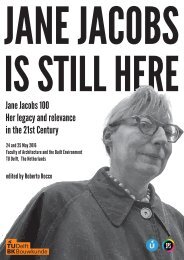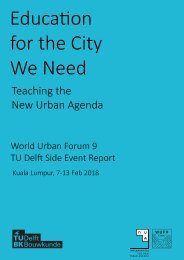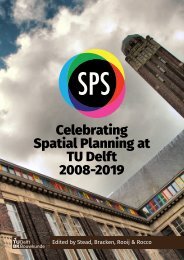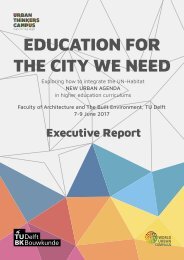The New Urban Normal Urban Sustainability and Resilience Post COVID-19
The COVID19 pandemic has exposed several systemic failures and injustices in the way cities are planned and designed around the world. It has also exposed the failings due to lack of planning in most places in the Global South. Careful, inclusive and participatory spatial planning is thought to greatly strengthen the capacity of societies to withstand systemic shocks, as testified by the New Urban Agenda (2016), the Pact of Amsterdam (2016) and the New Leipzig Charter (2020). Integrated affordable housing, for instance, has come to the top of the agenda once again, now propelled by the realisation that slum dwellers (a staggering 1 billion people around the world) and homeless people are particularly vulnerable to health crises and other societal shocks. The pandemic has been saluted as an opportunity to implement far-reaching transformation of our societies towards sustainability and justice, but little signs of systemic change have actually surfaced. For example, several cities around the world claim they will overhaul public space, take space from private cars, and invest more on green spaces, bicycle paths and quality public mobility. But little has been said about addressing the structural causes of inequality. The champions of the circular economy salute the pandemic as a new dawn for more human-centred capitalism, for the abandonment of exploitation and unfair distribution, and a world where workers can find decent housing, health, work and leisure. But what is actually happening on the ground?
The COVID19 pandemic has exposed several systemic
failures and injustices in the way cities are planned and
designed around the world. It has also exposed the failings
due to lack of planning in most places in the Global South.
Careful, inclusive and participatory spatial planning is
thought to greatly strengthen the capacity of societies to
withstand systemic shocks, as testified by the New Urban
Agenda (2016), the Pact of Amsterdam (2016) and the New
Leipzig Charter (2020). Integrated affordable housing, for
instance, has come to the top of the agenda once again,
now propelled by the realisation that slum dwellers (a
staggering 1 billion people around the world) and homeless
people are particularly vulnerable to health crises and
other societal shocks.
The pandemic has been saluted as an opportunity to
implement far-reaching transformation of our societies
towards sustainability and justice, but little signs of systemic
change have actually surfaced. For example, several cities
around the world claim they will overhaul public space,
take space from private cars, and invest more on green
spaces, bicycle paths and quality public mobility. But little
has been said about addressing the structural causes of
inequality. The champions of the circular economy salute
the pandemic as a new dawn for more human-centred
capitalism, for the abandonment of exploitation and unfair
distribution, and a world where workers can find decent
housing, health, work and leisure. But what is actually
happening on the ground?
You also want an ePaper? Increase the reach of your titles
YUMPU automatically turns print PDFs into web optimized ePapers that Google loves.
UTC <strong>Urban</strong> Thinkers Campus 61<br />
times of crisis. So, the ILO estimated that 1.6 million of the<br />
of the two billion informal workers have been significantly<br />
impacted by lock-down measures <strong>and</strong> or all working in the<br />
hardest hit sectors. What WIEGO has been hearing from the<br />
ground confirms this. <strong>The</strong>re’s been a particularly negative<br />
impact for women. Women predominate certain segments<br />
within the informal economy <strong>and</strong> current nationally<br />
representative data confirms this gender dimension.<br />
B. Impact: earnings, poverty <strong>and</strong> food insecurity. During<br />
the first month of the crisis the decline in informal worker<br />
earnings was 60 percent globally. <strong>The</strong> ILO highlights that<br />
likely the largest expected decline (81%) will be found in<br />
Africa. As lockdown measures are being eased, the hope<br />
is that earnings will have restarted. <strong>The</strong> loss of incomes in<br />
the informal economy is very worrying. One set of authors<br />
have suggested that it will jeopardize three decades of<br />
progress in human development. Some are saying even<br />
more. And there’s a particular dimension around food<br />
insecurity. <strong>The</strong> Food <strong>and</strong> Agricultural Organisation estimate<br />
that more than a quarter of a billion people suffered acute<br />
hunger in 2020. We also know that informal distributors<br />
<strong>and</strong> producers are critical to food security <strong>and</strong> in many<br />
contexts, were not able to operate under lockdown despite<br />
their important contribution.<br />
On the positive side, there has been a widespread response<br />
of cash grants or income grants. <strong>The</strong> last estimate shows<br />
that at least 131 countries grants have been distributed.<br />
Amounts are often low. Informal workers access to these<br />
grants has been mixed in terms of whether they’ve actually<br />
been able to tap into this support measure. But this can be<br />
a basis for pulling informal workers into the Social Security<br />
net. This is a critical issue.<br />
C. <strong>Urban</strong> policy responses: <strong>The</strong>re is a real a new appreciation<br />
of informal workers contribution to health care, transport,<br />
food distribution <strong>and</strong> waste systems. Some types of<br />
informal work was declared essential (e.g., informal food<br />
vendors, people in informal transport <strong>and</strong> waste recyclers).<br />
That said at the same time health concerns have driven<br />
further evictions of slum dwellers. And there’s a very<br />
close correlation between working informally <strong>and</strong> living<br />
informally.


